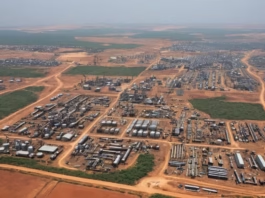The Call for a Fourth Industrial Development Decade
The African Union has recently emphasized the necessity for a Fourth Industrial Development Decade for Africa (IDDA), recognizing the critical importance of fostering sustainable development throughout the continent. This initiative aims to build upon the accomplishments of previous decades while steering the continent towards a more resilient and inclusive economic future. One of the pivotal goals of this new decade is to promote green manufacturing practices that are not only environmentally friendly but also economically viable.
The transition towards renewable energy sources is another central theme of the IDDA. As African nations grapple with energy deficit challenges, shifting towards renewable energy can lead to enhanced energy security and reduced dependency on fossil fuels. This transition aligns with global trends promoting cleaner energy alternatives and has the potential to drive job creation and innovation within various sectors.
Furthermore, the importance of digital transformation cannot be overstated. The integration of digital technologies into industrial processes not only enhances productivity but also opens up new avenues for growth and development. By leveraging digital tools and platforms, African countries can improve their access to global markets and heighten their competitive edge on the world stage.
Moreover, the African Continental Free Trade Area (AfCFTA) plays a crucial role in facilitating regional integration. The establishment of this trade area will promote intra-African trade by reducing tariffs and harmonizing trade policies among member states. This integration is essential for creating a unified market that can support industrial growth and drive economic development across the continent.
To achieve these ambitious goals, collaboration among various stakeholders, including governments, private sector actors, and civil society, is imperative. Engaging all parties in the IDDA initiative will ensure a multifaceted approach to industrial development, enabling Africa to fully harness its potential for sustainable growth and contribute meaningfully to global justice.
Progress and Persistent Challenges in Africa’s Development
Africa has made notable strides in various sectors, demonstrating resilience and potential for growth. In agribusiness, many countries are focusing on increased production and sustainable practices, aiming to transform agricultural output into one of the continent’s economic backbones. Projects aimed at enhancing food security, such as advances in crop yields through modern farming techniques and investment in irrigation systems, have shown promising results. Furthermore, the renewable energy sector has seen significant investments, particularly in solar and wind energy, which are pivotal in addressing energy shortages. This shift towards cleaner energy sources not only aims to provide reliable power but also supports global efforts in combating climate change. Additionally, digitalization has become a crucial focus, with improvements in technology adoption and internet access spurring innovations in finance, education, and logistics.
While these advancements are commendable, Africa faces persistent challenges that hinder its overall development. The continent’s contribution to global manufacturing remains relatively low, accounting for a minimal percentage of Gross Domestic Product (GDP). This underrepresentation is mirrored in the limited value addition to raw resources, which results in missed opportunities for economic diversification. Furthermore, trade costs across intra-African borders remain high, complicating efforts for an integrated continental market that could otherwise promote economic synergy and competitiveness.
Moreover, the barriers for small and medium enterprises (SMEs) are particularly concerning. Many entrepreneurs encounter substantial hurdles due to a lack of access to financing and advanced technology, stifling their growth and innovation potential. Addressing these challenges is fundamental for Africa, as fostering a conducive environment for SMEs can enhance job creation, boost investment, and ultimately contribute to a more robust industrial base. Recognizing and acting upon these critical areas is essential for maintaining a balanced approach to Africa’s ongoing development trajectory.
Framing Industrialization as a Matter of Justice
The discourse surrounding industrialization in Africa has evolved significantly, encompassing a nuanced understanding that intertwines economic growth with notions of justice and dignity. This framing has been articulated by various delegates, who have emphasized that industrialization is not merely an economic necessity but also a moral imperative. Delegates from countries such as Venezuela have taken a critical stance, condemning unilateral coercive measures that hinder the path toward sustainable development. They argue that such practices are reminiscent of neocolonialism, undermining the sovereignty and progress of African nations.
The ethical discourse surrounding industrialization posits that equitable industrial development is essential for enhancing the dignity of African populations. It recognizes that without a just approach to economic development, the benefits of industrialization may be unevenly distributed, further entrenching existing inequalities. This perspective aligns with the broader themes of global justice, wherein economic systems are critiqued for perpetuating disparities between developed and developing nations. Thus, advocacy for industrialization in Africa resonates with calls for fairness in international economic relations, ensuring that African countries can participate on equal footing in the global economy.
Moreover, delegates argue that the industrialization narrative must encompass social justice elements, ensuring that marginalized communities benefit from economic growth. The need for inclusive policies that consider the voices of all societal segments, particularly women and youth, is paramount. By framing industrialization as a matter of justice, proponents urge stakeholders to prioritize ethical considerations alongside economic objectives. This approach not only fosters sustainable development but also enhances Africa’s dignity on the global stage, signaling a commitment to achieve a more just and equitable world. The alignment of industrialization with these just principles marks a critical step in advancing both regional and global justice initiatives.
Global Partnerships and UN Reform: An Integrated Approach
As Africa marches towards a more industrialized future, global partnerships play a pivotal role in this evolution. The continent’s aspirations can only be realized through coordinated efforts that involve both African nations and the international community. A critical component of these partnerships lies in the commitment of developed nations to honor their obligations related to official development assistance (ODA), debt relief, and the transfer of technology. These elements are essential to providing the resources and innovations needed for Africa to capitalize on its vast potential within the global economy.
There is a pressing need for international stakeholders to move beyond mere rhetoric and take substantive actions that facilitate Africa’s industrialization. Fulfillment of ODA commitments is especially vital, as these funds can be directed towards essential infrastructure, education, and healthcare systems, which form the backbone of a thriving industrial economy. Debt relief initiatives further enhance this capacity by allowing countries to redirect funds towards development rather than servicing existing obligations. In this context, technology transfer emerges as a lifeline for African governments seeking to leverage modern advancements in manufacturing, renewable energy, and digital transformation.
Moreover, the discussions surrounding United Nations reforms are inherently connected to the needs of vulnerable states, including small island developing states (SIDS) that often face unique geographical and economic challenges. The UN’s ability to address these issues hinges on adequate resource allocation and enhancing operational efficiency. Strengthening the UN’s capacity to fulfill its mandates is paramount and should include prioritizing the needs of these nations. An integrated approach to global partnerships and UN reform is essential in ensuring that Africa’s journey towards industrialization is supported on multiple fronts, ultimately fostering global justice and sustainable development for all.



